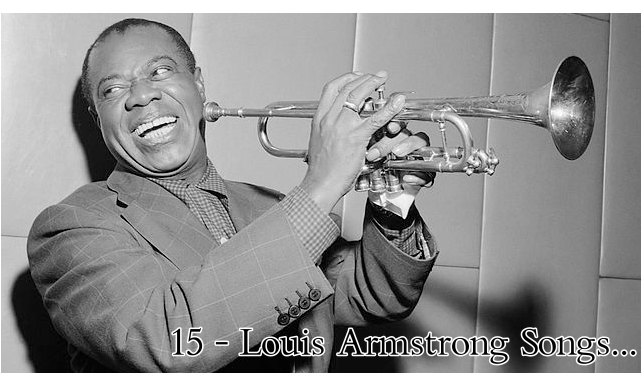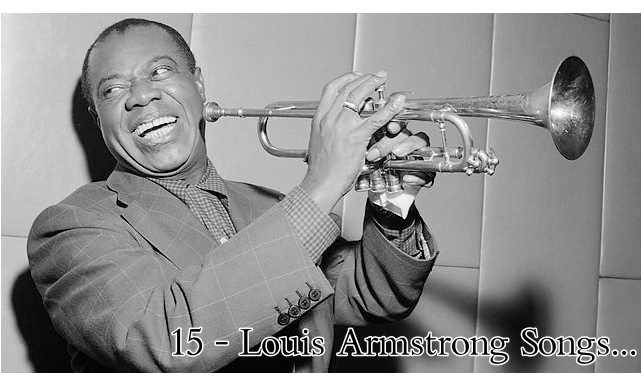-
 play_arrow
play_arrow
Praise 24/7 NO Today's Best Gospel

(ThyBlackMan.com) Louis Armstrong is undoubtedly one of the most influential musicians in American history. A towering figure in jazz and popular music, Armstrong’s gravelly voice, impeccable trumpet playing, and infectious charisma helped shape the landscape of 20th-century music. Known as “Satchmo” or “Pops,” Armstrong’s impact on jazz and swing music transcends generations, with his timeless recordings still captivating audiences today. His work laid the foundation for modern jazz, with innovative improvisation, masterful phrasing, and a distinctively joyful approach to music.
To truly appreciate Louis Armstrong’s genius, one must dive into his extensive catalog of recordings. Here are 15 essential songs that define his legacy, each a masterpiece that showcases his virtuosity, emotional depth, and undeniable charm.

1. What a Wonderful World (1967)
Perhaps Armstrong’s most recognizable song, “What a Wonderful World” is a timeless anthem of hope and optimism. Unlike his earlier jazz recordings, this track leans more toward pop balladry, with Armstrong’s warm, gravelly voice delivering the lyrics with profound sincerity. The orchestral arrangement complements his vocals beautifully, creating an uplifting and nostalgic experience. It’s a song that continues to resonate across generations, often used in films, commercials, and life’s most touching moments.
2. La Vie En Rose (1950)
Armstrong’s rendition of Edith Piaf’s “La Vie En Rose” is a stunning example of his ability to transcend language barriers with sheer emotion. His trumpet solos weep and soar, bringing a new depth to the classic French ballad. His uniquely textured voice adds a layer of raw beauty to the song, making it one of the most compelling versions ever recorded. This track is essential for any music lover looking to explore Armstrong’s softer, more romantic side.
3. West End Blues (1928)
A landmark recording in jazz history, “West End Blues” is often cited as one of Armstrong’s most important contributions to music. His opening trumpet cadenza is nothing short of revolutionary, setting a new standard for solo improvisation. The song’s bluesy undertones, combined with Armstrong’s fluid phrasing and technical mastery, make it an essential listen for anyone wanting to understand the depth of early jazz. The interplay between Armstrong and pianist Earl Hines showcases some of the finest musicianship of the era.
4. When the Saints Go Marching In (1938)
This traditional spiritual song became a jazz standard largely due to Armstrong’s lively interpretation. His version transformed it from a church hymn into a jubilant, celebratory anthem that remains synonymous with New Orleans jazz. Armstrong’s energetic trumpet playing and charismatic delivery make this track an unforgettable experience. The song’s infectious rhythm and call-and-response sections have ensured its lasting popularity in jazz parades and festivals worldwide.
5. Hello, Dolly! (1964)
One of Armstrong’s later career hits, “Hello, Dolly!” took the world by storm, knocking The Beatles off the top of the charts in 1964. His joyful, swinging rendition of the Broadway tune cemented his reputation as an entertainer who could still captivate audiences decades after his early jazz innovations. The song’s bouncy, playful arrangement, coupled with Armstrong’s signature growl, makes it an absolute delight.
6. Stardust (1931)
Armstrong’s version of Hoagy Carmichael’s “Stardust” is a masterclass in lyrical phrasing and melodic interpretation. His trumpet work sings as beautifully as any vocalist, and his delivery of the lyrics is filled with tenderness and nostalgia. This track exemplifies Armstrong’s ability to bring out the emotional core of a song, making it one of the most beloved recordings of this jazz standard.
7. Mack the Knife (1956)
Taken from “The Threepenny Opera,” this song became a jazz and pop staple, thanks in part to Armstrong’s charismatic and swinging interpretation. His vocal phrasing, playful delivery, and the crisp brass section elevate the track into a thrilling musical experience. Armstrong’s rendition influenced later versions, including Bobby Darin’s famous recording, but remains one of the most iconic takes on the song.
8. Ain’t Misbehavin’ (1929)
Originally written by Fats Waller, “Ain’t Misbehavin’” became one of Armstrong’s signature songs. His easygoing vocal delivery and impeccable trumpet lines turn the tune into a joyous declaration of devotion. The recording captures the essence of early jazz, blending playful melodies with effortless swing.
9. Basin Street Blues (1928)
Named after the famous street in New Orleans, this song captures the soulful essence of jazz in the city. Armstrong’s version features stunning improvisations, a lush arrangement, and a relaxed, bluesy feel. His ability to make the song feel both deeply personal and universally relatable makes this an essential addition to any jazz lover’s playlist.
10. Dream a Little Dream of Me (1950)
Armstrong’s duet with Ella Fitzgerald on “Dream a Little Dream of Me” is pure magic. Their chemistry, effortless vocal interplay, and rich, warm tones make this one of the most charming love songs in jazz history. Armstrong’s trumpet solo adds an extra layer of emotion, making it an unforgettable recording.
11. Do You Know What It Means to Miss New Orleans? (1947)
This nostalgic ballad, first featured in the film New Orleans, beautifully captures the longing and love for Armstrong’s hometown. His deeply emotional performance, both on vocals and trumpet, turns the song into a love letter to the city that shaped his music.
12. Someday You’ll Be Sorry (1947)
One of Armstrong’s most heartfelt compositions, “Someday You’ll Be Sorry” showcases his songwriting ability alongside his legendary trumpet playing. The song’s melancholic yet hopeful lyrics resonate deeply, and Armstrong’s soulful delivery makes it a must-listen.
Finish story here; 15 Essential Louis Armstrong Songs That Define Jazz Greatness.
Written by: Black Gospel Radio
Similar posts
-

D.K. Smith
For every Show page the timetable is auomatically generated from the schedule, and you can set automatic carousels of Podcasts, Articles and Charts by simply choosing a category. Curabitur id lacus felis. Sed justo mauris, auctor eget tellus nec, pellentesque varius mauris. Sed eu congue nulla, et tincidunt justo. Aliquam semper faucibus odio id varius. Suspendisse varius laoreet sodales.
close Top popular

The Science of Happiness – Exploring Factors for Well-Being

Balancing Act: Prioritizing Your Well-Being in a Busy World

Overcoming Procrastination – Strategies for Productivity and Success

Unlocking Hidden Potential – A Guide to Personal Growth

Mindful Living – Cultivating Presence in the Modern Era

CONTACT US
- info@praise247no.com
FOLLOW US
- Praise247NO
- Praise247NO
- Praise247NO
Copyright 2024 Praise247no.com - All Rights Reserved.




Post comments (0)